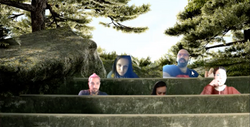Transnational Education Mentoring Partnership (TEMP)

Program: HORIZON 2020
Theme: Open schooling and collaboration on science education
Topic-ID: Topic SwafS-01-2018-2019
NEED / PROBLEM
Classroom-centered teaching and learning is often disconnected from day-to-day life of the community. Both schools and universities are challenged by the discussion about the societal relevance of their achievements and their level of interaction with society. This is visible in current debates about societal connectivity, ranging from models of “Third Mission of Universities”, “Responsible Research and Innovation” to “Swafs” or “Community Based Learning”.
TARGET GROUP
-
Direct target group: teachers, educators, professors, youth work
-
Indirect target group: youth, scholar students, university students and adult people students
OBJECTIVES
-
To offer to teachers, educators, professors, youth workers, trainers the space to share their experience in their own field and the difficulties they face in dealing with mantaining their students motivated and ensuring a both teoretical and practical teaching
-
To provide to teachers, educators, professors, youth workers, trainers with the opportunity to develop their transferable skills and competeces in order to widen their proffesional possibilities and to have the needed flexibility to explore different educational environment, enriching their experience.
-
To create a more cohesive and collaborative educational system which will guarantee not only knowledge, but also transferable skills and competences according to the requirements of our current globalised societies.
METHODOLOGIES DEVELOPED
Personalized Learning
Project-Based Learning (PBL)
Place-Based Education
Formative Assessment
Real-World Learning
RESULTS

The main result of this project will be a Manual of 5 succesfull educational methodologies (Real-World learning, Project-based learning, Place-based learning, Personalized learning and Formative assesment), including examples of activities based on these methodologies for each educational field represented by the partners of the consortium (school education, youth education, university and youth education). For developing this result we will develop several deliverables:
Reports
TEMP Educational Guide
Piloting report
 |  |  |
|---|---|---|
 |  |  |
















.png)



